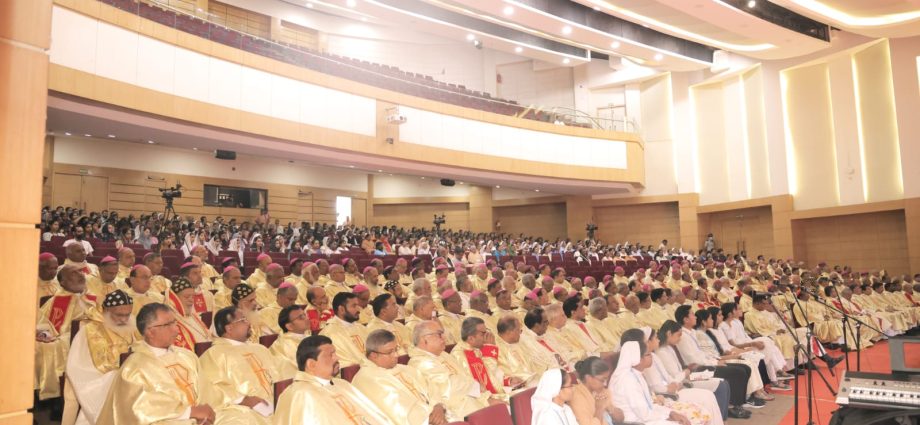By Jose Kavi
New Delhi, Feb 7, 2024: Increasing attacks and harassment on Christian institutions and personnel in India will not prevent the Church from serving the poor and downtrodden, assert the Catholic bishops in the country.
“As loyal citizens of India, we will continue serving our country whatever be the cost, walking in the footsteps of Jesus our Master,” says the final statement of the 36th biennial meeting of the Catholic Bishops’ Conference of India (CBCI).
More than 170 bishops representing the country’s 174 dioceses attended the January 31-February 7 plenary at Bengaluru’s St John’s National Academy of Health Sciences, managed by the conference.
They addressed the theme, “The Church’s Response to the Current Socio-Political Situation of the Country and the Benefits and Challenges of Artificial Intelligence (AI).”
The meeting has asked all dioceses in the country to observe March 22 as a day of prayer and fasting to seek God’s help to foster India’s democracy and social harmony.
The call comes a couple of months ahead of the general election in the country. The term of the current federal government will end in May.
While reviewing the current situation in India, the bishops noted the country’s “tremendous advances in the scientific, technological, economic and other fields” that have helped it emerge as an economic power.
“The Christian community feels proud of our country’s progress,” says the six-page statement signed by CBCI president Archbishop Andrews Thazhath of Trichur and secretary general Archbishop Anil Couto of Delhi.
However, the bishops regret that the country’s development has apparently benefited “on a small percentage” while the rest of the population, especially in rural areas, struggle with increasing unemployment and large-scale migration that brought misery to millions, pushing them to the other side of the digital divide.
The bishops also expressed apprehensions over divisive attitudes, hate speeches and fundamentalist movements that erode the secular ethos that characterize India and its Constitution.
Referring to the attacks on Christians in the different parts of the country, the bishops bemoaned the destruction of homes and churches and harassment of those serving orphanages, hostels, educational and healthcare institutions on “false allegations of conversion.”
While the bishops were at the meeting, a Catholic priest, five Protest pastors and a lay man were arrested and sent to judicial custody in the northern Indian state of Uttar Pradesh.
They were accused of conversion activities. A lower court on February 7 denied their bail application. The Church people now plan to go to higher courts to get their release.
One of the topics for the bishops’ meet was the ongoing violence in the northeastern Indian state of Manipur.
The bishops said they are “appalled by prolonged violence in Manipur resulting in the huge loss of life and livelihood.”
Violence between Meitei and Kuki ethnic communities began May 3. A sizable number of Kukis is Christian while Meiteis are mostly Hindu.
The bishops also expressed concern over the weakening of important democratic institutions and federal structures and failure of the media to fulfill their role as the fourth pillar of democracy.
Another factor that undermines democracy, the bishops noted, is an unprecedented religious polarization that harms social harmony.
The bishops appealed to the political leaders in the country to preserve the basic structure of the Constitution, especially the Preamble that declares India as a sovereign socialist secular democratic republic that is committed to justice, liberty, equality and Fraternity.
Ahead of the general elections, the bishops want all citizens to enroll as voters and elect leaders who are committed to constitutional values and the advancement of the poor.
The bishops reiterated their decades-old demand that the government grant the Scheduled Caste status to Dalit Christians and other discriminated minorities. The also urged the government to desist from attempts to deprive Christian tribal people their Scheduled Tribe status.
The bishops also affirmed their decision to journey together people of goodwill, sharing each other’s joys and sorrows.
For this, they have decided to educate their people to build bridges with people of other religions through interreligious dialogue and neighborhood communities.


Amen
Is This What We Wanted From This So Called Govt. Common Minority Class Being Harrased In Everyways..Where Is The Country Leading With Such Type of Cruelty towards The Lower Grade Citizens…Does Our Constitution Permit This…Is This A So Called Smart India…Are We Not The Part Of Our Country…Are We Not the Voters Of This Country…This Is The Time We All Must Know Well Before Casting Our Valuable Votes Only For Good Governance.
Christians form only 2.3% of the Indian population of 140 crore. We are a minuscule minority and our votes will hardly make any difference (except in one or two North-eastern states) to stop the current juggernaut in its tracks.
It’s disheartening to see that the Indian social fabric is slowing eroding and the democratic nature of our constitution is at threat by the so called guardians of democracy namely the politicians. Hope this improve for better and the gap between the rich and poor decrease